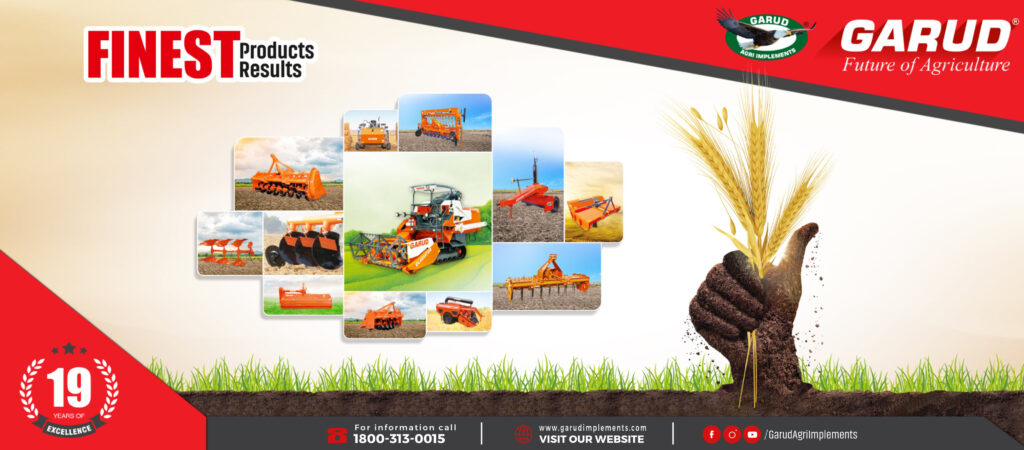The Rise of Organic Farming: Techniques for a Sustainable Future
October 3, 2024“Revolutionizing Agriculture: A Deep Dive into Modern Agricultural Implements”
November 19, 2024In an era where sustainability is no longer a choice but a necessity, agricultural machinery is playing an increasingly vital role in transforming farming practices to be more eco-friendly. Farmers worldwide are embracing new technologies to improve efficiency, reduce waste, and minimize environmental impacts while maintaining profitability. From precision agriculture to energy-efficient equipment, agricultural machinery is shaping the future of sustainable farming.

1. Precision Agriculture: Enhancing Resource Efficiency
Precision agriculture is a cornerstone of sustainable farming, and modern machinery is at the heart of this approach. With the help of GPS-guided tractors, drones, and smart sensors, farmers can monitor and manage their fields with incredible accuracy. This technology allows for precise application of seeds, water, fertilizers, and pesticides, ensuring that resources are used efficiently.
For instance, GPS-equipped planters can place seeds at exact intervals and depths, leading to higher germination rates and reducing the need for replanting. Similarly, variable-rate technology (VRT) on sprayers and spreaders ensures that fertilizers and chemicals are applied only where needed, minimizing overuse and runoff that can harm the environment. These innovations reduce input costs and help farmers optimize crop yields while reducing the ecological footprint.
2. Reduced Tillage and Soil Health
Soil health is critical to sustainable farming,https://www.youtube.com/@GarudAgriImplements and machinery has evolved to support practices that protect and enhance the soil. Traditional tilling methods, while effective for weed control and seedbed preparation, can cause soil erosion, compaction, and degradation over time. In contrast, modern no-till and reduced-till machinery allow farmers to minimize soil disturbance, preserving its structure and organic matter.
No-till drills, for example, can plant seeds without the need to plow the field first, maintaining soil integrity and reducing erosion. By using these machines, farmers not only conserve soil health but also reduce fuel consumption, as fewer passes are needed across the field. This contributes to both sustainability and cost savings.
3. Water Conservation through Irrigation Technology
Water is one of the most precious resources in agriculture, and sustainable farming requires the efficient use of this vital resource. Agricultural machinery equipped with advanced irrigation technology is helping farmers conserve water by delivering it where and when it’s needed most.
Drip irrigation systems, for instance, provide a targeted water supply directly to the root zone of crops, reducing evaporation and runoff. Modern irrigation machinery can be automated and controlled using sensors and software, allowing for real-time adjustments based on weather conditions and soil moisture levels. This precision in water management not only conserves water but also improves crop health and yields, aligning with sustainable farming objectives.
4. Energy-Efficient and Low-Emission Machinery
As farmers strive to reduce their carbon footprint, the demand for energy-efficient and low-emission agricultural machinery has grown. Manufacturers are responding by developing electric, hybrid, and biofuel-powered machines that minimize greenhouse gas emissions and reduce dependence on fossil fuels.
Electric tractors, for example, are becoming a viable alternative to traditional diesel-powered models, offering the same performance with a fraction of the emissions. Hybrid machinery that combines electric and fuel power also helps reduce fuel consumption while maintaining operational efficiency. In addition to reducing emissions, these machines often come with lower operating costs, further enhancing the sustainability of farming operations.
5. Renewable Energy Integration
Incorporating renewable energy into farming practices is another key aspect of sustainability, and agricultural machinery is evolving to support this trend. Solar-powered irrigation systems, for example, harness solar energy to pump water from wells or rivers, reducing the need for grid electricity or diesel-powered generators. Some farms are even using wind turbines and biogas digesters to power machinery and other farm operations, further reducing their reliance on non-renewable energy sources.
The integration of renewable energy into agricultural machinery not only helps lower carbon emissions but also provides farmers with a more resilient and self-sufficient energy supply, especially in remote or off-grid areas.
6. The Future of Sustainable Farming Machinery
The future of agricultural machinery is poised to make farming even more sustainable. Autonomous and robotic technologies are expected to play a major role in reducing labor, energy, and resource inputs. Self-driving tractors, for example, can work around the clock with minimal human intervention, optimizing field operations and reducing fuel consumption.
Robotic harvesters are also being developed to reduce food waste and improve harvesting efficiency. These machines can work faster and more accurately than humans, minimizing crop damage and ensuring that only fully ripened produce is harvested. Additionally, drones equipped with multispectral cameras and AI-powered analytics are being used to monitor crop health, allowing for early detection of pests, diseases, or nutrient deficiencies.
Conclusion
Agricultural machinery is essential in driving sustainable farming practices, helping farmers increase productivity while reducing environmental impact. From precision planting and no-till farming to water-saving irrigation systems and energy-efficient tractors, modern machinery is making it possible to farm smarter and more sustainably. As technology continues to advance, agricultural machinery will remain at the forefront of efforts to feed a growing global population while protecting the planet for future generations.
Sustainable farming is not just a trend; it’s the future of agriculture. And agricultural machinery is a critical tool in making that future a reality.
